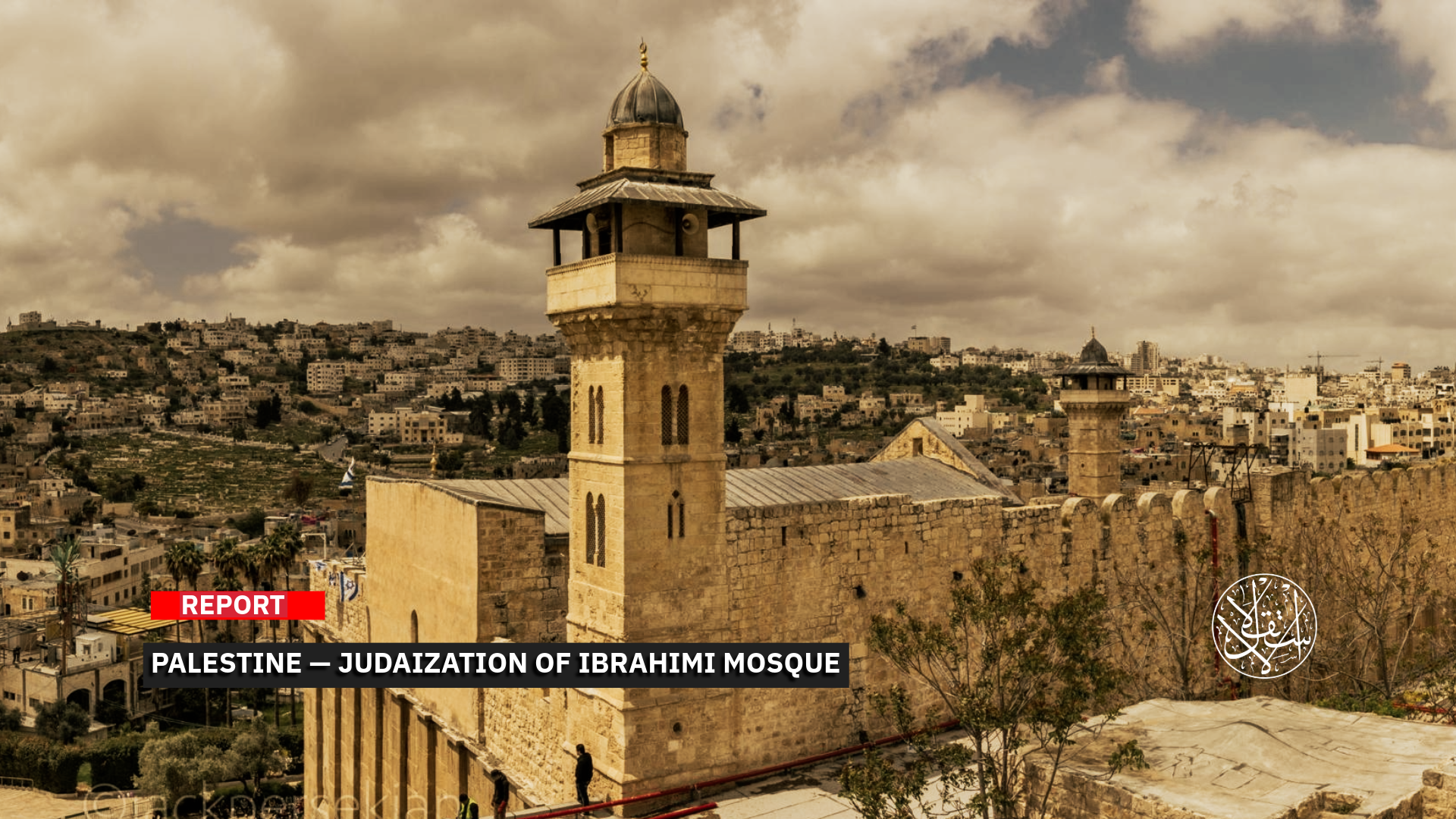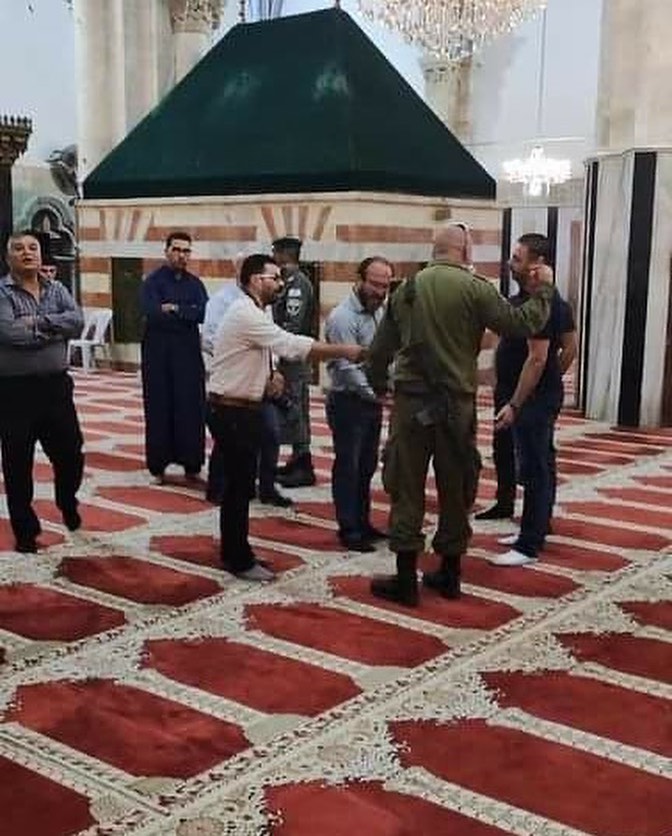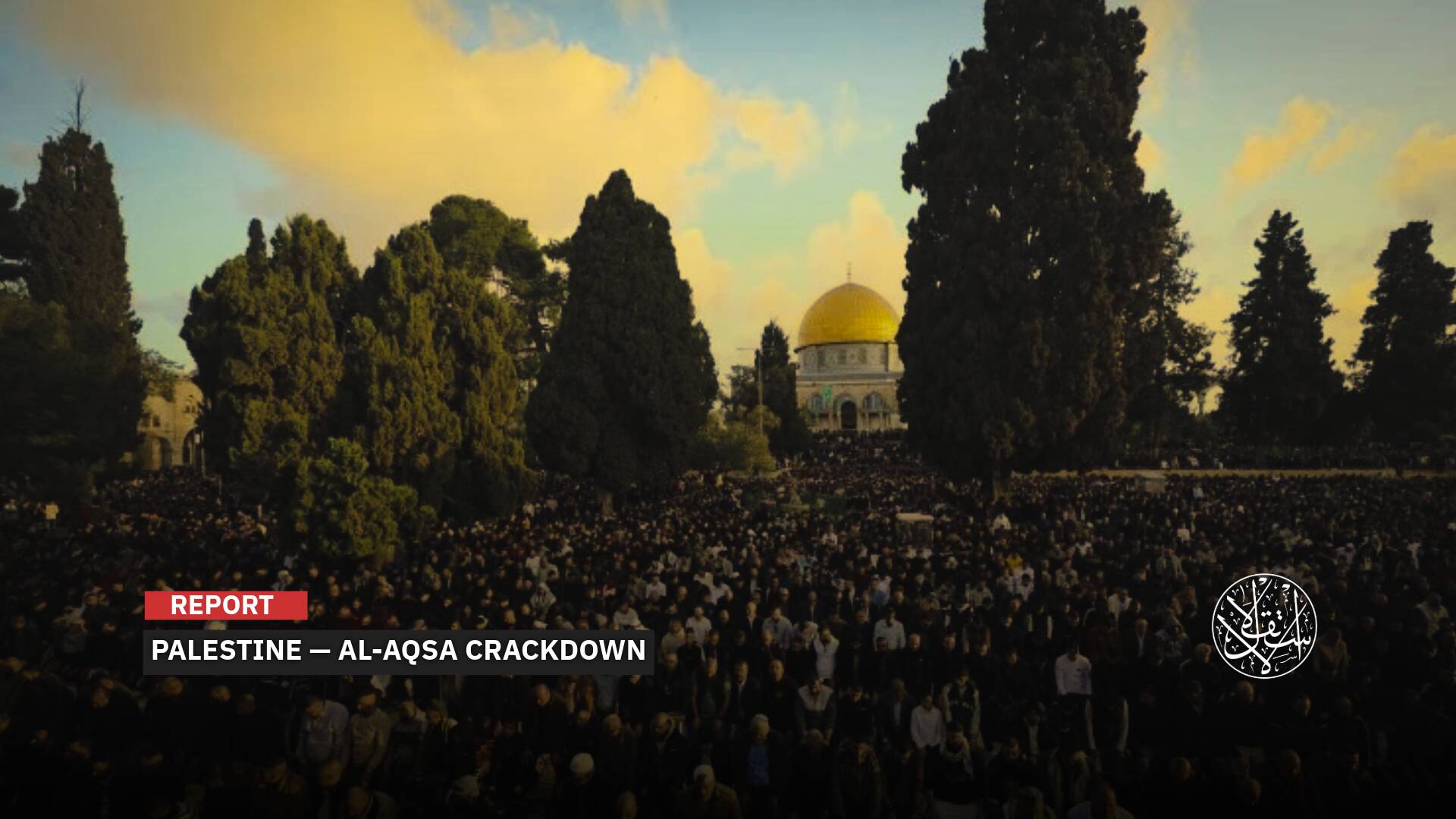Rehearsal for al-Aqsa: Israeli Occupation Strips Waqf Control of Ibrahimi Mosque, Gives It to Settlers

The Israeli Occupation's attempts to erase all Palestinian presence in Occupied Jerusalem never stop.
In a move that effectively ends the “status quo” arrangement in place at the Ibrahimi Mosque in Hebron since 1967, the Israeli Occupation stripped the Palestinian Waqf of its authority over the site and transferred control to a settler council.
The decision, made secretly by Israeli authorities and revealed only through Israeli Occupation media—without informing the Waqf—has raised serious concerns about the loss of Muslim sovereignty over one of the city's holiest landmarks, which is also Islam’s fourth holiest site.
Israel's removal of Waqf oversight from the Ibrahimi Mosque, after a series of previous steps to sideline it since the 1967 occupation, appears to be a “rehearsal” for a similar plan targeting al-Aqsa Mosque.
This seems to be a test by “Israel” to gauge the reaction of Palestinians and the broader Arab and Islamic world to the new reality at the Ibrahimi Mosque—potentially paving the way for the same to happen at al-Aqsa and for “Israel” to completely end the status quo there as well. In other words, a rehearsal for al-Aqsa’s future.
The Ibrahimi Mosque is located in Hebron’s Old City, under Israeli occupation. Around 400 settlers live there, protected by about 1,500 Israeli soldiers. Now, a religious council representing these settlers will be in charge of the mosque.
In 1994, the mosque witnessed a horrific massacre during Ramadan, when Baruch Goldstein, a follower of extremist Rabbi Meir Kahane and an American from New York, stormed the mosque with an automatic weapon, killing 30 Muslim worshippers and injuring 125.
Instead of addressing the atrocity, the Israeli authorities rewarded the settlers by granting them control over 63% of the mosque, leaving Muslims with just 37%—while restricting prayers, banning the call to prayer, and prohibiting Muslim access during Jewish holidays.
Major Shift
On July 15, 2025, Israeli Occupation authorities officially revoked the Hebron municipality’s authority over the Ibrahimi Mosque and transferred it to the religious council of the Kiryat Arba settlement, built on Palestinian land.
According to Israel Hayom, the Israeli Occupation has handed full management of the mosque to Kiryat Arba’s settler council, which has already begun making changes that expand the space for Jewish religious practices.
The paper called it great news for the settlement project, describing the decision as a “historic and unprecedented change,” that alters the status quo at the site.
It reported that the Israeli Civil Administration had stripped Hebron’s Palestinian municipality of its authority and handed it to the Kiryat Arba religious council.
Although details of the exact powers transferred were not provided, the paper said the move aims to facilitate structural modifications at the site.
Israel Hayom added that War Minister Israel Katz approved the decision, which involves major structural changes including constructing a roof over the “Jacob’s Courtyard,” adding walls, and installing fire safety systems.
It claimed this is the most significant change to the site since the 1994 massacre, and that these modifications are already underway.
The justification given by Israeli Occupation authorities is that the mosque is a “Jewish religious site with no connection to Muslims or Palestinians,” reflecting the Israeli Occupation’s ongoing control over the Ibrahimi Mosque.

Prelude to the Takeover
In February 2025, the Israeli Occupation withdrew the Palestinian Waqf’s authority to oversee the Ibrahimi Mosque and handed it over to the Israeli Civil Administration as part of a broader plan to expand Israeli control over the site.
This early move by the Israeli authorities to transfer full management of the mosque to a Jewish body paved the way for the July 15, 2025, decision to shift control to the settler council of Kiryat Arba and completely remove the Waqf from any authority over the mosque.
There had already been a previous attempt in 2024 by settlers to impose a new reality by trying to take over the mosque courtyard. That move aimed to give them control of around 80% of the site, in preparation for turning it into a Jewish temple and preventing Muslims from entering altogether.
These efforts go back to 2005, when settlers first pitched a tent in the courtyard and claimed it was a place of worship. Over time, they expanded the area of the tent and gradually turned it into a synagogue within the mosque’s courtyard. They are now working to build a permanent roof over it.
On July 11, 2024, the Hebron Waqf Directorate confirmed that settler groups had begun construction work to install a roof over the mosque’s courtyard. They had erected heavy iron pillars and metal sheets and poured concrete to cover the open area.
Although Israeli Occupation forces halted the settlers’ construction after a wave of protests in Hebron and objections by the Palestinian Ministry of Religious Affairs, the Israeli Occupation has now returned with force—removing the Waqf’s authority over the mosque entirely and handing it over to the settler council.
This move ensures the implementation of the plan by allowing the construction of the roof without interference, under official Israeli approval.
Palestinian Minister of Endowments and Religious Affairs, Mohammed Najm, confirmed that the Israeli attempts to build a roof over the courtyard of the Ibrahimi Mosque are part of a broader effort to convert the site into an exclusively Jewish synagogue.
He also said the aim is to strip the Palestinian Ministry of Waqf of its authority, take full control of the mosque, erase its religious, historical, and Islamic identity, and override both the spatial and temporal divisions imposed since 1994.

What the Decision Means
But what exactly does this decision mean—especially since it's the first time since 1994 that the Waqf has been completely stripped of authority over the Ibrahimi Mosque?
Does this imply that the Jewish settler council will now fully control the site, reshape it, remove the prayer areas and minarets, and ultimately turn it into a Jewish temple?
Palestinians, quoting officials in the Waqf, expressed fears that this may indeed happen—especially if the settler council goes ahead with removing the Muslim section of the mosque.
However, these officials believe that the decision—which hasn't been formally announced and was only reported in Israeli newspapers—might be a way to test the waters and gauge Palestinian, Arab, and Islamic reactions. If the response is weak, the decision could then be officially implemented.
On July 17, 2025, the director of the Ibrahimi Mosque, Moataz Abu Sneineh, warned in an interview with Middle East Eye that the Israel Hayom report could be “a test to measure the Palestinian reaction before taking any official steps.”
That same day, Palestinian Minister of Endowments and Religious Affairs Mohammad Najm visited the mosque along with senior officials from the ministry, emphasizing that the mosque remains Islamic property.
“The Ibrahimi Mosque is purely Islamic and belongs solely to Muslims. No one has the right to tamper with its historical or religious identity,” Najm said.
“The Palestinian presence at the mosque is deep-rooted and enduring, despite the Israeli Occupation’s attempts to impose full control.”
Scholars and religious leaders at the Ibrahimi Mosque say the current move—where the Israeli Occupation has taken over supervision and administration of the mosque and stripped the Waqf of its authority, followed by imposing a new reality by turning the mosque courtyard into a Jewish temple—is just one part of a larger plan that began after the occupation of Jerusalem and the West Bank.
Islamic organizations, including the Muslim World League and the Organization of Islamic Cooperation, have condemned the Israeli decision.
Meanwhile, Turkiye’s Ministry of Foreign Affairs strongly rejected Israeli Occupation’s attempts to change the status quo at the Ibrahimi Mosque in Hebron, in the southern West Bank, describing it as “a seizure of powers that rightfully belong to the Palestinians.”

Radical Changes
The first major changes to the Ibrahimi Mosque were made in 1994, when an Israeli committee called the “Shamgar Committee” decided to divide the site, giving 63% of it to Jewish control and 37% to Muslims.
Now, after the decision to remove the Waqf’s authority over the mosque, Israeli Occupation authorities would gain full control—100%—effectively banning Muslims completely. This would cancel the 1994 division set by the Shamgar Committee.
The new decision also clearly violates the Hebron Agreement (the 1997 Protocol on Redeployment), which stated that services at the mosque would be provided by Hebron’s municipality and that the Islamic Waqf would be responsible for the Muslim section.
Following the Shamgar Committee’s rulings, which came after the 1994 massacre carried out by extremist settler Baruch Goldstein, Israeli authorities tightened military control around the mosque. They seized 63% of it, converted it into a synagogue, banned the Maghrib call to prayer daily, and prohibited all calls to prayer on Saturdays except for the night prayer.
People in Hebron say this decision was expected, especially after increasing Judaization measures in 2024 and 2025. These included hundreds of bans on the call to prayer, closing the mosque to Muslims on religious occasions, refusing to open its eastern gate during Ramadan and the two Eids, digging in the mosque’s courtyards, installing an electric elevator for settlers, placing Israeli alarm systems, refusing to return the mosque to Muslim worshippers during holidays, locking its doors, and expanding military checkpoints around it.
Officials from the Palestinian Waqf and local historians say the Israeli decision means full religious and administrative control over the mosque and a complete erasure of the existing status quo agreements since 1967. They say transferring supervision to the Jewish religious council in the Kiryat Arba settlement is a formal annexation of the Ibrahimi Mosque into Jewish religious property. This would mean preventing Muslims from praying there entirely and taking away even the 26% of space that Israeli authorities had previously allocated to them in 1994—essentially canceling earlier agreements by force.
Strengthening Judaization
The director of the Ibrahimi Mosque, Moataz Abu Sneineh, said the Israeli move is meant to push forward Judaization plans. He added that any interference with the mosque’s physical structure suggests that “Israel” is using current “regional conflicts” to impose new facts on the ground.
He said if this plan is confirmed, it would be a clear and serious violation of a place with great religious, historical, and cultural value, especially since the mosque is listed as a UNESCO World Heritage site. On July 17, 2025, in an interview with Middle East Eye, Abu Sneineh said the mosque’s guards are still performing their duties and that nothing has changed on the ground for now, but the announcements are dangerous and part of a wider effort to change the current reality.
Hebron Mayor Tayseer Abu Sneineh warned in a statement and in comments to Palestinian media that changing the status of the Ibrahimi Mosque represents a serious violation of international law and all relevant agreements, including the Hebron Protocol and the recommendations of the Shamgar Committee.
The Palestinian Scholars Association clearly warned of the consequences and goals of the Israeli decision, stating that taking control of the Ibrahimi Mosque is a step toward taking control of al-Aqsa Mosque as well.
Groups advocating for the so-called Third Temple have already begun calling on the Israeli government to take similar action at al-Aqsa Mosque—stripping the Islamic Waqf of its authority there and transferring it to Israeli authorities and those who carry out incursions into the site.
Abdallah Marouf, a professor of Jerusalem Studies and former head of public relations at al-Aqsa Mosque, said that what “Israel” is doing by transferring oversight of the Ibrahimi Mosque from the Waqf to settlers is exactly what they hope to do at al-Aqsa.
“The Israeli Occupation’s attempts to erase all Palestinian presence in Occupied Jerusalem have never stopped. Among these efforts was the closure of the Alquds Fund, aimed at tightening control over the holy city,” he told Al-Estiklal.
“Al-Aqsa is facing an ongoing series of violations designed to impose full Israeli Occupation sovereignty over the mosque, such as closing it during certain times and completely banning Muslim prayer.”
Sources
- Israel transfers authority for Ibrahimi Mosque in West Bank to settler council: Report
- West Bank: Israel quietly hands Ibrahimi Mosque control to settler council
- Israel assumes control over Cave of the Patriarchs
- Palestinians warn of ‘dangerous’ Israeli plan to hand Ibrahimi Mosque to settlers
- Transferring Control of the Ibrahimi Mosque to Settlers: The Most Dangerous Escalation Since the Hebron Massacre" [Arabic]










